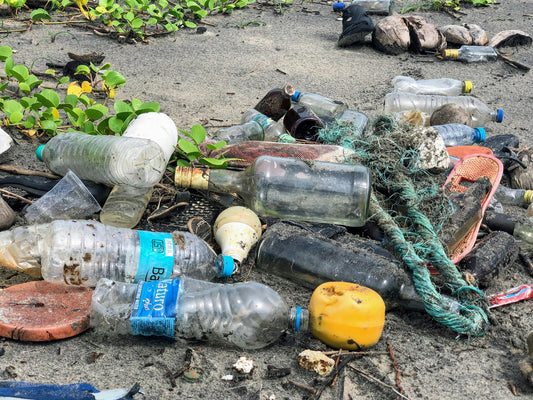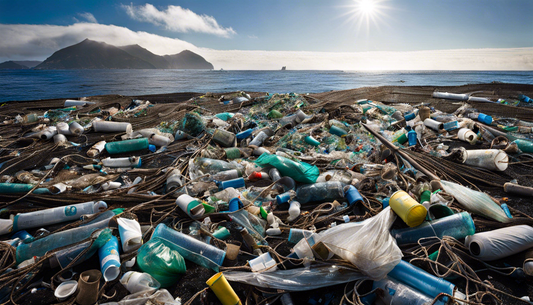Share
True Sustainability is more important then ever!
The world has woken up to environmental problems, and this has caused businesses around the globe to implement various sustainability strategies.
Consumer trends have changed widely. People are more likely to buy products that are made through sustainable processes, even if they are expensive. More than 73% of Gen Z agrees to pay more for sustainable products.
However, some companies tend to hide their eco-friendly practices or portray meaningless messages about their brands' sustainability.
These concepts are known as greenwashing and greenhushing.
In this article, we will learn what these concepts are and how they are posing significant threats to our ecosystem.
What is Greenwashing?

This concept originated in the 1960s, especially when hotels urged guests to reuse towels to "save the environment," which in turn profited the hotels from reduced laundry expenses and created the impression of a concern for the environment.
Greenwashing is a deceptive technique that companies use to present their products or practices as being more environmentally friendly than they really are.
This can be done by highlighting the green attributes of a product while not mentioning in any way the harmful practices that are taking place in other parts of the company.
Common Examples of Greenwashing Strategies Implemented By Companies
Businesses have adapted different creative strategies to fake their sustainability efforts. If you look carefully as a consumer you will be able to spot them.
Tricky Labels:
This is done by brands when they do not back up their claims of being "eco-friendly" or "natural" with evidence.
Tiny Changes:
Companies that aim to make minor amendments are still bad for the environment as a whole.
Big Claims:
They are just saying positive things about saving the environment, but they have no proof.
Fancy Packaging:
Creating eco-friendly packaging for something that isn't environmentally friendly at all, like a non-degradable plastic brush that is used and thrown away.
Pretty Pictures:
Adding pictures of nature in commercials makes people believe that by simply buying some of the products, they are contributing to the preservation of the environment, even though they often are not.
Examples of Companies That Were Fined For Green Washing

1) Volkswagen:
Fine: $34.6 million
Accusation:
The company introduced software that provided false data and helped minimize emission tests on its vehicles.
2) ENI (Italian Oil Firm)
Fine: $5.6 million
Accusation:
The company was accused due to their deceptive marketing campaign, claiming their diesel was eco-friendly.
3) DWS Investment Firm
Fine: $25 million
Accusation:
The company claimed to be an environmental, social, and governance (ESG) leader from 2018 to 2021 but didn’t implement ESG policies as they promised to investors.
4) Kohl’s and Walmart
Fine: $5.5 million
Accusation:
The company was accused that they are violating the Textile Act by marketing products. They claimed that their bamboo-derived textile materials were eco-friendly, whereas they weren’t.
What is Greenhushing?

Greenhushing is the same as keeping secrets about the positive actions that a company has done for the environment.
It is when corporations choose to hide their commitments and actions to help the environment, such as their goals and actions, from customers or the public.
Rather than boasting about their 'green' campaigns, greenhushing companies prefer to keep their operations in the dark or disclose minimal information on steps they are taking to conserve the environment.
Some people might say that they are being modest, but if they do not share what they are doing to help the environment, they also cannot be held accountable.
One of the main reasons behind greenhushing is that companies don’t want to commit to sustainability claims. If they decide to market what they have been doing for sustainability, people start expecting more from them. The companies then have to put in extra effort towards sustainability and come up to the expectations of general public.
While greenshushing is less conspicuous than greenwashing, it still withholds important information.
A side effect of greenhushing is: When companies don’t disclose their progress, they might not inspire others to make changes themselves, and they deprive their customers of the opportunity to make informed choices.
Examples of Greenhushing
Not Telling Everything:
Some companies may not share the full details of their green activities, such as using less energy or generating less waste.
Not Talking About It:
Companies don't often talk about the good sides of their ecological sustainability, but people often don't know how much they are really helping.
Being Vague:
When companies use words that sound meaningless about green initiatives, it is hard to know what they are actually doing.
Not Getting Recognized:
Some companies are not trying to win awards or get certificates for their eco-friendly actions, although they are doing something good for the environment.
Why Should Companies Focus on Genuine Sustainability Efforts?

In today's world, the importance of dealing with environmental problems has become extremely high.
Climate change, loss of biodiversity, pollution, and resource depletion are some of the complex challenges that are worsening the planet's health and jeopardizing the well-being of future generations.
Hence, businesses are expected to respond to this challenge by engaging in real sustainability initiatives.
Ethical responsibility
Corporate responsibility is to diminish the negative effects on the environment and community and should be given preference as compared to the company’s well-being.
Long-term viability:
Sustainability initiatives enhance operational resilience, minimize risks, and yield long-term advantages in a marketplace that is constantly changing.
Consumer expectations:
Nowadays, consumers increasingly look at transparency, authenticity, and accountability in brands, and they prefer those that have a genuine approach towards sustainability.
Regulatory compliance:
Tougher environmental regulations demand companies to make sustainability part of their business strategies. Otherwise, they risk being non-compliant or attracting financial penalties.
Innovation and efficiency:
Sustainability creates innovations, resource efficiency, cost reduction, and sector development that is of a green nature.
Investor confidence:
Corporate social responsibility with a high level of sustainable performance draws in responsible investors who give a nod to lower financing costs and boost shareholder value.
Both Consumers and Businesses are Accountable

As the fight against greenwashing and greenhushing continues, both consumers and business groups can play active roles in promoting transparency and genuineness.
Consumers can take action by learning about ethical principles and exploring misleading tactics, requesting companies to be transparent and accepting brands that sincerely engage in environmental efforts.
However, businesses must emphasize authenticity instead of surface green marketing and strive for long-term improvement in sustainability practices, thus setting an example in their industry.
The companies that choose the true sustainability pathway place transparency, accountability, and innovation at the core of their business.
They build sustainability into their corporate values, business practices, and decision-making to have a good impact on the planet and society without compromising the business.
Together, we can be part of slowing down greenwashing and greenhushing by educating people, advocating for regulations, and promoting sustainable lifestyles.
We hope you enjoyed this article. If you want to read more like this, make sure to check out our Blog and follow us on Instagram. If you are interested in truly sustainable products, check out our Shop.
If you want to engage in the discussion, feel free to leave a comment below.








